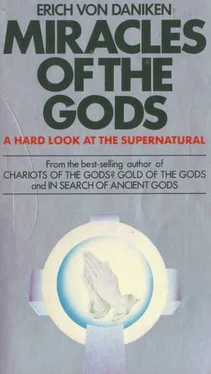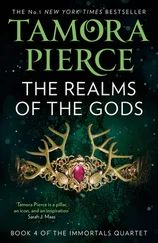Erich Daniken - Miracles of the Gods
Здесь есть возможность читать онлайн «Erich Daniken - Miracles of the Gods» весь текст электронной книги совершенно бесплатно (целиком полную версию без сокращений). В некоторых случаях можно слушать аудио, скачать через торрент в формате fb2 и присутствует краткое содержание. Жанр: Физика, на английском языке. Описание произведения, (предисловие) а так же отзывы посетителей доступны на портале библиотеки ЛибКат.
- Название:Miracles of the Gods
- Автор:
- Жанр:
- Год:неизвестен
- ISBN:нет данных
- Рейтинг книги:4 / 5. Голосов: 1
-
Избранное:Добавить в избранное
- Отзывы:
-
Ваша оценка:
- 80
- 1
- 2
- 3
- 4
- 5
Miracles of the Gods: краткое содержание, описание и аннотация
Предлагаем к чтению аннотацию, описание, краткое содержание или предисловие (зависит от того, что написал сам автор книги «Miracles of the Gods»). Если вы не нашли необходимую информацию о книге — напишите в комментариях, мы постараемся отыскать её.
Miracles of the Gods — читать онлайн бесплатно полную книгу (весь текст) целиком
Ниже представлен текст книги, разбитый по страницам. Система сохранения места последней прочитанной страницы, позволяет с удобством читать онлайн бесплатно книгу «Miracles of the Gods», без необходимости каждый раз заново искать на чём Вы остановились. Поставьте закладку, и сможете в любой момент перейти на страницу, на которой закончили чтение.
Интервал:
Закладка:
Do a man a favour without expecting anything in return from him (Z)
23.
Except ye ... become as little children ... (C)
Let ideas and thoughts be and become as a little child (Z)
24.
For whosoever exalteth himself shall be abased (C)
He who is too haughty will rise very little (T)
25.
Everyone that hath forsaken ... wife, or children, or ... for my name's sake (C)
True knowledge is only this: liberation from dependence on wife and child, on house and home (Hi)
26.
Blessed are the pure in heart: for they shall see God (C)
He who is pure of heart is blessed here and blessed after death (Z)
27.
In my Father's house are many mansions (C)
The angel of love ... has prepared fair dwellings for us (Z)
28.
The kingdom of heaven is within you (C)
Heaven is inside you (B)
29.
If any man will come after me, let him deny himself, and take up his cross and follow me (C)
A Bodhisattva (a being destined for illumination) said: I take the burden of all suffering upon me. I do not turn round or run away (B)
30.
As thou, Father, art in me, and I in thee (C)
Stay with me in my soul (M)
31.
Woman, why weepest thou? I ascend to my Father Father, into thy hands I commend my spirit It is finished (C)
Lament not, mother; now ascend into heaven (M)
Take my spirit, I pray thee, up to the stars (M)
It is finished (M)
Roland Puccetti (50), Professor of Philosophy and Theology at Singapore, is concerned with the central problem of the Christian faith, namely whether its claim to universality is justified. According to Puccetti, if this claim were accepted, most of mankind would be excluded from salvation, because they had never had the opportunity to receive 'the joyous message' of Christ's birth and his teaching.
Puccetti[28] says that even if the gospel were generally diffused over our planet -which we all know is not true - only an insignificant part of all intelligent beings in the universe would have heard of it, whereas the claim to universality also entails the duty and mission of making the doctrine of salvation known to all living beings, of allowing them to share in it.
Professor E.L. Mascall [29] says that in the tradition of Christian theology the fact has already been emphasized, as the real meaning of salvation, that the Son of God became one with the species he was going to save. The Son of God became man in Mascall's analysis so that men could become God's children through him. But we need not be alarmed by the prospect of innumerable incarnations and crucifixions in the universe. For, says the theologian, 'the very fact that the victorious redemption of mankind was finally achieved on our planet by Christ's resurrection would justify a repetition in other places. In other words, if it is possible in one case for the mortal and the eternal to unite in one person, why should not it also be possible in several cases?'
In continuation of this idea Professor Puccetti comes to the conclusion that a single organic person definitely cannot be more than one organic person, however many incorporeal persons he may represent simultaneously ... 'Incorporeal persons can be everywhere at any time, but corporeal persons can only be in one place in the universe at the same time.' Puccetti, who, very courageously for a theologian, introduces the latest scientific findings into his religio-philosophical interpretations, tries to explain the central question 'how could the Son of God become man in the universe several times - perhaps in 10 18 places - without simultaneously being more than one organic person? He comes to the conclusion that it is impossible, but adds, if we take as a basis the above-mentioned figure of possible societies of extraterrestrial natural persons in the known galaxies (which make up approximately onetenth of all galaxies), and if we assume that the lifetime of Jesus of Nazareth represents the average duration of an incarnation of the Son of God, it would take 34 X 10 18 years before the Son of God had spent the time from birth to resurrection on each of the planets in Succession.
The life expectation of stars whose planetary systems possibly offer the prerequisites for the development of intelligent life is only (1-5) X 10 10 years in our galaxy. If we also accept this figure for the rest of the known inter-galactic universe, between 680,000,000 and 3,400,000,000 incarnations would have to take place simultaneously from today until the extinction of life on all these stars! If we deduct previous incarnations, the figure is reduced a little, but not enough to make any appreciable difference.
If God is supposed not only to have assumed the appearance of a single member of a rational corporeal species, but also to have assumed its essence through his Son, whereby he would have transferred his personality to this species, we would have to infer that there existed simultaneously in the universe many organic persons who were 'divine beings' in the Christian sense of the words. The following supposition makes it very clear what that would mean for Christianity. Let us assume that we could establish contact with a society fifty light years away from us and transmit the text of the New Testament to it. In answer we would receive a television picture of their Christ. He turns out to have nine fingers on each hand, four legs, a thick blue skin and long bones. We could then scarcely answer
'Yes, that is Christ' for that would be tantamount to saying, 'That is the Son of God as he appears to you!' which would be sheer Docetism. (*)
On the other hand we could not deny his divine status (assuming he preached his 'Sermon on the Mount', died on the cross for their sins, etc.), for he would have the same right to it as Jesus of Nazareth. What could we do? We had Jesus of Nazareth and they had their 'X Christ': both were beings assumed by God, and both species would be included in Christ's 'being man' or 'being X' as separate incarnations of God's word. But if the Son of God happens but once, how can he be simultaneously wholly man and wholly X, i.e. exist as two different corporeal persons? Two corporeal persons are not one. A further point is that we should have quite as much reason for worshipping the ostensible 'X Christ' as our own Jesus Christ, and Christianity would no longer embrace a Trinity, but a fourfoldness, a 'Quadrinity' as it were.
And the following are not my words (although they form my opinion, too!), the scholarly theologian Puccetti is saying them, the professor who worries about the existence of Christianity in the future: What Christianity can do is to disregard the probable existence of intelligent extraterrestrial beings completely. In fact it could happen that Christianity - possibly alone among the great living religions - would be proved false by experiments in interstellar communication.
----
[*] Docetism was a second-century heresy which claimed that God only apparently became man in Jesus.
----
The news that Jesus was an astronaut has been haunting the press and relevant literature for some time, like the Loch Ness monster, sometimes accepted, sometimes dismissed.
The inventor of the latest Jesus cult is the Soviet philologist Dr. Vyatcheslav Saitsev of the University of Minsk. Saitsev believes that Jesus came from outer space, that he was a representative of a higher civilization and that that would partially explain his supernatural powers and abilities. Saitsev actually says [30]: 'In other words, God's descent to earth is really a cosmic event.'
Essays by Dr. Vyatcheslav Saitsev on 'A Spaceship in the Himalayas' and 'Angels in Spaceships' in the Soviet periodical Sputnik spurred me on to travel to Moscow in the summer of 1968. I cannot go along with Saitsev in his latest speculations.
Читать дальшеИнтервал:
Закладка:
Похожие книги на «Miracles of the Gods»
Представляем Вашему вниманию похожие книги на «Miracles of the Gods» списком для выбора. Мы отобрали схожую по названию и смыслу литературу в надежде предоставить читателям больше вариантов отыскать новые, интересные, ещё непрочитанные произведения.
Обсуждение, отзывы о книге «Miracles of the Gods» и просто собственные мнения читателей. Оставьте ваши комментарии, напишите, что Вы думаете о произведении, его смысле или главных героях. Укажите что конкретно понравилось, а что нет, и почему Вы так считаете.











